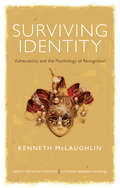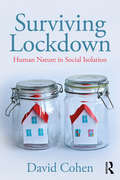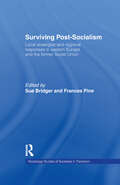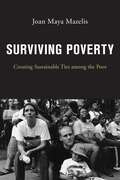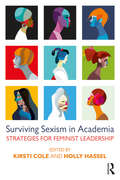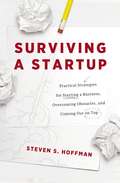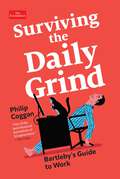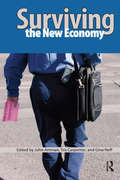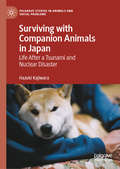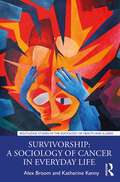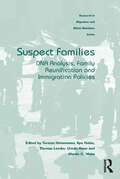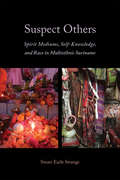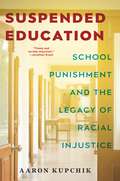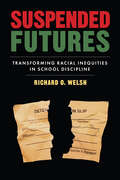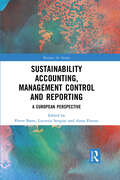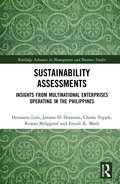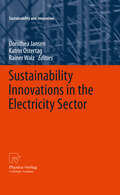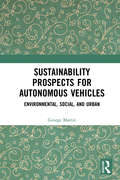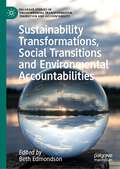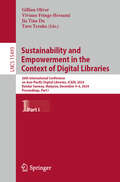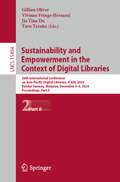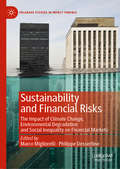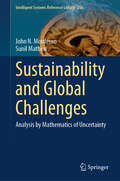- Table View
- List View
Surviving Identity: Vulnerability and the Psychology of Recognition (Concepts for Critical Psychology)
by Kenneth McLaughlinToday, political claims are increasingly made on the basis of experienced trauma and inherent vulnerability, as evidenced in the growing number of people who identify as a "survivor" of one thing or another, and also in the way in which much political discourse and social policy assumes the vulnerability of the population. This book discusses these developments in relation to the changing focus of social movements, from concerns with economic redistribution, towards campaigns for cultural recognition. As a result of this, the experience of trauma and psychological vulnerability has become a dominant paradigm within which both personal and political grievances are expressed. Combining the psychological, social, and political aspects of the expression of individual distress and political dissent, this book provides a unique analysis of how concepts such as "vulnerability" and "trauma" have become institutionalised within politics and society. It also offers a critical appraisal of the political and personal implications of these developments, and in addition, shows how the institutionalisation of the survivor identity represents a diminished view of the human subject and our capacity to achieve progressive political and individual change. This book will be of interest to researchers, postgraduate and undergraduate students of critical psychology, sociology, social policy, politics, social movements and mental health.
Surviving Lockdown: Human Nature in Social Isolation
by David Cohen2020 has been the year of the virus, and it will not be a mere footnote in history. This book reflects on the unprecedented changes to our lives and the impact on our behaviour as we lived through social isolation during the global COVID-19 pandemic. From sociable creatures of habit, we were forced into a period of uncertainty, restriction and risk, physically separated from families and friends. Packed with guidance and coping strategies for lockdown, this book, authored by top psychologist David Cohen, explores the impact of this widespread quarantine on our relationships, our children, our mental health and our daily lives. Benedictine monks, hermit popes, Dorothy Sayers, Daniel Defoe (who made the isolated Robinson Crusoe a hero), Sigmund Freud and a rabbi’s angry dog are all among the cast of characters as we are taken on a whistle-stop tour through plagues in history and brain science, to the importance of introspection and how to make meaning from lockdown. In his trademark entertaining style, Cohen examines the psychology behind our behaviour during this unusual time to discover what we can learn about human nature, what lessons we can learn for the future – and whether we will apply them.
Surviving Post-Socialism: Local Strategies and Regional Responses in Eastern Europe and the Former Soviet Union (Routledge Studies of Societies in Transition #Vol. 4)
by Sue Bridger Frances PineThis book focuses on survival strategies developed at local levels in response to changing cultural, political and economic structures in Eastern Europe and the former Soviet Union. An interdisciplinary approach is adopted as the contributors engage with questions of gender, ethnicity, migration, nationalism, employment and labour patterns and changing family structures.
Surviving Poverty: Creating Sustainable Ties among the Poor
by Joan Maya MazelisSurviving Poverty carefully examines the experiences of people living below the poverty level, looking in particular at the tension between social isolation and social ties among the poor. Joan Maya Mazelis draws on in-depth interviews with poor people in Philadelphia to explore how they survive and the benefits they gain by being connected to one another. Half of the study participants are members of the Kensington Welfare Rights Union, a distinctive organization that brings poor people together in the struggle to survive. The mutually supportive relationships the members create, which last for years, even decades, contrast dramatically with the experiences of participants without such affiliation. In interviews, participants discuss their struggles and hardships, and their responses highlight the importance of cultivating relationships among people living in poverty. Surviving Poverty documents the ways in which social ties become beneficial and sustainable, allowing members to share their skills and resources and providing those living in similar situations a space to unite and speak collectively to the growing and deepening poverty in the United States. The study concludes that productive, sustainable ties between poor people have an enduring and valuable impact. Grounding her study in current debates about the importance of alleviating poverty, Mazelis proposes new modes of improving the lives of the poor. Surviving Poverty is invested in both structural and social change and demonstrates the power support services can have to foster relationships and build sustainable social ties for those living in poverty.
Surviving Sexism in Academia: Strategies for Feminist Leadership
by Holly Hassel Kirsti ColeThis edited collection contends that if women are to enter into leadership positions at equal levels with their male colleagues, then sexism in all its forms must be acknowledged, attended to, and actively addressed. This interdisciplinary collection—Surviving Sexism in Academia: Strategies for Feminist Leadership—is part storytelling, part autoethnography, part action plan. The chapters document and analyze everyday sexism in the academy and offer up strategies for survival, ultimately 'lifting the veil" from the good old boys/business-as-usual culture that continues to pervade academia in both visible and less-visible forms, forms that can stifle even the most ambitious women in their careers.
Surviving a Startup: Practical Strategies for Starting a Business, Overcoming Obstacles, and Coming Out on Top
by Steven S. HoffmanThe CEO of Founders Space, one of the world's leading startup incubators and accelerators, prepares entrepreneurs to avoid disastrous mistakes, surmount sizable obstacles, and master the skills necessary to make the right choices along their path to success.The fact is, over 90 percent of all new startups fail. Every entrepreneur must face this harsh reality and learn to master it if they hope to survive and wind up on top.In Surviving a Startup, Steve Hoffman, the CEO of Founders Space, brings readers on a wild ride, sharing with them the tumultuous journey of launching a venture-funded startup and revealing what it takes to make it.This one-of-a-kind guide: Provides deep analysis and insights into the major challenges every entrepreneur faces when launching a business.Prepares entrepreneurs to make the best possible decisions and deal with crisis situations.Illuminates strategies for raising capital and growing a business, even when it seems impossible.Divulges secrets on how to manage difficult employees, demonstrate leadership, and overcome disasters.Describes the essential traits that enable startup founders to survive and succeed.Reveals the best way to develop innovative products, conduct guerilla marketing campaigns, obtain PR, and outmaneuver competitors.Shows how to recruit the best talent, even with no money, manage highly efficient teams, and motivate employees to go above and beyond their assigned responsibilities.Lays out the steps necessary to take a fledgling idea and transform it into a robust, rapidly growing business that has the potential to become the next multimillion-dollar acquisition or IPO.As the captain of one of the world's leading startup incubators and accelerators, Steve knows what it's like to be on the front lines, how tough it can get when the battle turns against the entrepreneur, and what it takes to taste victory and overcome seemingly impossible odds.
Surviving in My World: Growing Up Dalit in Bengal
by Sekhar Bandyopadhyay Manohar Mouli Biswas Angana Dutta Jaideep SarangiIT GIVES US great pleasure to present the English translation of Manohar Mouli Biswas's Bengali autobiography Amar Bhubane Ami Benche Thaki (2013). The book consists of the autobiography and a detailed interview of the author; the latter attempts to bridge the gap between Biswas's days of struggle as a dalit child labourer, as narrated in the autobiography, and his later (so far unrecorded) life as an accomplished dalit literary activist, as one of the leading members of the Bangla Dalit Sahitya Sanstha. His auto¬biography surprises us by its inherent truth and beauty.
Surviving the Daily Grind: Bartleby's Guide to Work (Economist Books)
by Philip CogganOne of today's pre-eminent financial journalists, and the Bartleby columnist for the Economist, reveals strategies and tips for surviving—and making the most out of—the work week. We spend a lot of our time at work and would be depressed with nothing to do. But when it gets to Monday, many of us are already longing for the weekend and the prospect of escape. How did work become so tedious and stressful? And is there anything we can do to make it better? Based on his popular Economist Bartleby column, Philip Coggan rewrites the rules of work to help us survive the daily grind. Ranging widely, he encourages us to cut through mindless jargon, pointless bureaucracy and endless meetings to find a new, more creative—and less frustrating—ways to get by and get things done at work. Incisive, original, and endlessly droll, this is the guide for beleaguered underlings and harried higher-ups alike. As Rousseau might have said: "Man was born free, but is everywhere stuck in a meeting." If you've ever thought there must be a better way, this is the book for you.
Surviving the New Economy
by Gina Neff John Amman Tris CarpenterThe dot-com boom of the late 1990s marked the coming of age of the much-heralded New Economy, an economic, technological, and social transformation that was decades in the making. A highly mobile, and in many cases highly compensated, workforce faces a multitude of new risks: Jobs are no longer secure nor insulated from global competition, employer-provided health benefits are drying up, and retirement planning is almost entirely the responsibility of employees themselves. This timely book examines the challenges facing high-tech workers and other professionals and the relevance of these struggles for the future of the economy. Written by leading experts, Surviving the New Economy shows how people working in technology industries are addressing their concerns via both traditional collective bargaining and through innovative actions. Using case studies from the United States and abroad, the authors in this collection examine how highly skilled workers are surviving in a global economy in which the rules have changed-and how they are reshaping their workplaces in the process.
Surviving with Companion Animals in Japan: Life after a Tsunami and Nuclear Disaster (Palgrave Studies in Animals and Social Problems)
by Hazuki KajiwaraThis book examines how relationships between guardians and companion animals were challenged during a large-scale disaster: the tsunami of March 2011 and the following nuclear disaster in Fukushima. The author interrogates: 1) How did guardians and their companion animals survive the large disaster?; 2) Why was the relationship between guardians and their companion animals ignored during and after a disaster?; and 3) What structures and/or mechanisms shaped the outcomes for animals and their guardians? Through a critical realist framework, combined with a theoretical perspective developed by Roy Bhaskar and his colleagues, the author argues that despite the trivialization of companion animals by government officials, relationships between animals and guardians were often able to be maintained, in some cases through great pains by the guardians. While the notion of human-animal relationships in Japan has thus far been dominated by economic logic, the author reveals dynamics between guardians and companion animal transcend such structures, forging the concept of “bonding rights.”
Survivorship: A Sociology Of Cancer In Everyday Life
by Alex Broom Katherine KennyThis book provides a contemporary and comprehensive examination of cancer in everyday life, drawing on qualitative research with people living with cancer, their family members and health professionals. It explores the evolving and enduring affects of cancer for individuals, families and communities, with attention to the changing dynamics of survivorship, including social relations around waiting, uncertainty, hope, wilfulness, obligation, responsibility and healing. Challenging simplistic deployments of survivorship and drawing on contemporary and classical social theory, it critically examines survivorship through innovative qualitative methodologies including interviews, focus groups, participant produced photos and solicited diaries. In assembling this panoramic view of cancer in the twenty-first century, it also enlivens core debates in sociology, including questions around individual agency, subjectivity, temporality, normativity, resistance, affect and embodiment. A thoughtful account of cancer embedded in the undulations of the everyday, narrated by its subjects and those who informally and formally care for them, Survivorship: A Sociology of Cancer in Everyday Life outlines new ways of thinking about survivorship for sociologists, health and medical researchers and those working in cancer care settings.
Suspect Families: DNA Analysis, Family Reunification and Immigration Policies (Research In Migration And Ethnic Relations Ser.)
by Thomas Lemke Torsten Heinemann Ilpo Helén Ursula Naue Martin WeissSuspect Families is the first book to investigate the social, political, and ethical implications of parental testing for family reunification in immigration cases. Drawing on policy documents, legal frameworks, case study material and interviews with representatives of governmental and non-governmental organisation and immigration authorities, immigration lawyers, geneticists and applicants for family reunification, the book analyses the different political regimes and social arrangements in which DNA analysis is adopted for decision-making on family reunification in three distinct European countries: Austria, Finland and Germany. Interdisciplinary in scope, the book reconstructs the processes, institutional logic and the political and administrative practices of DNA testing from a comparative perspective, combining theoretical conceptualisation with detailed empirical work to explore the central societal, political and ethical issues raised by the use of DNA profiling in the context of immigration policy. A ground-breaking study of the role played by new technologies in migration decisions, Suspect Families will appeal to scholars of sociology, political science, science and technology studies and surveillance studies.
Suspect Others: Spirit Mediums, Self-Knowledge, and Race in Multiethnic Suriname (Anthropological Horizons)
by Stuart Earle StrangeSuspect Others explores how ideas of self-knowledge and identity arise from a unique set of rituals in Suriname, a postcolonial Caribbean nation rife with racial and religious suspicion. Amid competition for belonging, political power, and control over natural resources, Surinamese Ndyuka Maroons and Hindus look to spirit mediums to understand the causes of their successes and sufferings and to know the hidden minds of relatives and rivals alike. But although mediumship promises knowledge of others, interactions between mediums and their devotees also fundamentally challenge what devotees know about themselves, thereby turning interpersonal suspicion into doubts about the self. Through a rich ethnographic comparison of the different ways in which Ndyuka and Hindu spirit mediums and their devotees navigate suspicion, Suspect Others shows how present-day Caribbean peoples come to experience selves that defy concepts of personhood inflicted by the colonial past. Stuart Earle Strange investigates key questions about the nature of self-knowledge, religious revelation, and racial discourse in a hyper-diverse society. At a moment when exclusionary suspicions dominate global politics, Suspect Others elucidates self-identity as a social process that emerges from the paradoxical ways in which people must look to others to know themselves.
Suspended Education: School Punishment and the Legacy of Racial Injustice
by Aaron KupchikHow the historic resistance to racial desegregation in schools led to the over-punishment of students todayEvery year, millions of public school students are suspended. This overused punishment removes students from the classroom, but it does not improve their behavior. Instead, suspension disrupts their education, harming the students, their families, and their schools. Black students suffer most within this broken system, experiencing a far greater risk of school punishment and the significant harms that accompany it. Many activists and scholars have considered how school punishment increases racial inequity, but few have thought to ask why. Why do we punish students the way we do, and why have we allowed this harmful practice to impact the lives of our nation’s children?In Suspended Education, Aaron Kupchik takes readers to the root of the issue. Suspensions were not intended as a behavior management tool. Instead, they were designed to remove unwanted students from the classroom. Through statistical analysis and in-depth case studies of schools in Massachusetts and Delaware, Kupchik reveals how suspension rates skyrocketed after the 1954 Brown v. Board of Education decision, serving as an unofficial means of removing Black children from newly desegregated schools. His groundbreaking research traces the legacy of these segregationist movements, demonstrating that school districts with more desegregation-related legal battles from the 1950s onward suspend more Black students today. Combining expert analysis with compelling, accessible prose, Kupchik makes a powerful case for the end of suspension and other exclusionary punishments. The result is a revelatory explanation of a pressing problem facing all children, parents, and educators today.
Suspended Futures: Transforming Racial Inequities in School Discipline (Race and Education)
by Richard O. WelshAn incisive examination of the school discipline crisis and a strategic, evidence-driven playbook for educational decision-makers who aim to resolve disciplinary disparities
Sustainability Accounting, Management Control and Reporting: A European Perspective (Business for Society)
by Pierre BaretSustainability Accounting, Management Control and Reporting: A European Perspective traces a picture of innovative performance measurement tools and approaches to drive organizations to implement their shared value and sustainability strategy, considering different perspectives around accounting, managerial control and reporting. In recent years, organizations managing their responsible approach with relevance and pressure from stakeholders and regulations has proven to be a major challenge. During the first two decades of the 21st century, many companies have reached a real maturity in this area and have deployed coherent responsible approaches that are integrated into their overall strategy. It is now a matter of steering these responsible approaches from an accounting and managerial standpoint, but also of reporting on them. It requires the simultaneous use of comprehensive accounting, controlling and reporting tools. This book provides an innovative perspective on sustainable management control, comprehensive accounting and integrated reporting, presenting the most recent proposals and the main critical issues. Aimed at researchers, academics, managers, business leaders and advanced students, the book will be especially valuable to those in the fields of corporate social responsibility, strategic management, and accounting.
Sustainability Accounting, Management Control and Reporting: A European Perspective (Business for Society)
by Pierre BaretSustainability Accounting, Management Control and Reporting: A European Perspective traces a picture of innovative performance measurement tools and approaches to drive organizations to implement their shared value and sustainability strategy, considering different perspectives around accounting, managerial control and reporting. In recent years, organizations managing their responsible approach with relevance and pressure from stakeholders and regulations has proven to be a major challenge. During the first two decades of the 21st century, many companies have reached a real maturity in this area and have deployed coherent responsible approaches that are integrated into their overall strategy. It is now a matter of steering these responsible approaches from an accounting and managerial standpoint, but also of reporting on them. It requires the simultaneous use of comprehensive accounting, controlling and reporting tools. This book provides an innovative perspective on sustainable management control, comprehensive accounting and integrated reporting, presenting the most recent proposals and the main critical issues. Aimed at researchers, academics, managers, business leaders and advanced students, the book will be especially valuable to those in the fields of corporate social responsibility, strategic management, and accounting.
Sustainability Assessments: Insights from Multinational Enterprises Operating in the Philippines (Routledge Advances in Management and Business Studies)
by Jerome D. Donovan Cheree Topple Eryadi K. Masli Hermann Lion Rowan BedggoodThis book looks at how multinational enterprises address sustainability within their business activities. Contextualized within a rapidly developing country in Asia, it explores how management practices, tools and techniques are implemented by foreign multinational enterprises (MNEs) operating in the Philippines. The book introduces a useful three-stage and six-step sustainability assessment framework for company practices. The three stages are framed around impact identification, impact assessment and impact monitoring, with the six steps associated with these stages, including the initiation step, scoping, impact analysis, alternative selection, monitoring and evaluation, and feedback and follow-up. The book also highlights how voluntary guidelines and global sustainability platforms play an instrumental role in directing the practices of organisations when implementing corporate sustainability.
Sustainability Innovations in the Electricity Sector
by Dorothea Jansen Katrin Ostertag Rainer WalzThe future of modern societies depends on their ability to deal with the challenge of climate change in the coming decades. One essential component is a better understanding of innovation processes in the energy sector. This book focuses on sustainability innovations in renewable energies, combined heat and power, and energy service contracting, and analyses the institutions, actors and functions within the innovation system. Of particular interest is the question of whether the joint effect of EU-driven market liberalization and climate policies will succeed in establishing market forces that will drive actors towards more climate-friendly energy production. A special focus is on the role of local utilities in the electricity sector as opposed to large transmission net operators or regional net operators. The countries covered in the contributions include Germany, Denmark, the UK, Switzerland, and the Netherlands.
Sustainability Prospects for Autonomous Vehicles: Environmental, Social, and Urban
by George T. MartinThe Autonomous Vehicle (AV) has been strongly heralded as the most exciting innovation in automobility for decades. Autonomous Vehicles are no longer an innovation of the future (seen only in science fiction) but are now being road-tested for use. And yet while the technical and economic success and possibilities of the AV have been widely debated, there has been a notable lack of discussion around the social, behavioural, and environmental implications. This book is the first to address these issues and to deeply consider the environmental and social sustainability outlook for the AV and how it will impact on communities. Environmental and social sustainability are goals unlike those of technical development (a new tool) and economic development (a new investment). The goal of sustainability is development of societies that live well and equitably within their ecological limits. Is it reasonable and desirable that only technical and economic success comprise the swelling AV parade, or should we be looking at the wider impacts on personal well-being, wider society, and the environment? The uptake for AVs looks to be lengthy, disjointed, and episodic, in large measure because it faces a range of known unknown risks. This book assesses the environmental and social sustainability potential for AVs based on their prospective energy use and their impacts on climate change, urban landscapes, public health, mobility inequalities, and individual and social well-being. It examines public attitudes about AV use and its risk of fostering a rebound effect that compromises potential sustainability gains. The book concludes with a discussion of critical issues involved in sustainable AV diffusion.
Sustainability Transformations, Social Transitions and Environmental Accountabilities (Palgrave Studies in Environmental Transformation, Transition and Accountability)
by Beth EdmondsonThis book draws upon diverse approaches and understandings of sustainability transformations, social transitions and environmental accountabilities. It presents case studies that highlight real-world consequences of changing ideas about how best to achieve effective and durable sustainability transformations and examines how environmental accountabilities and social transitions influence sustainability transformations. Each chapter provides insights regarding how new knowledge and perspectives matter for whether, when, and how people, governments, corporations and international organisations seek and pursue solutions to social-ecological challenges and sustainability dilemmas. It pays sustained attention to whether and how understandings and applications of accountability can improve international sustainability transformations. The chapters presented in this book consider some pressing questions concerning social transitions and environmental accountabilities: how can they contribute to sustainability transformations, how do they influence the scalability of sustainability transformations, and, how can such sustainability transformations become durable?
Sustainability and Empowerment in the Context of Digital Libraries: 26th International Conference on Asia-Pacific Digital Libraries, ICADL 2024, Bandar Sunway, Malaysia, December 4–6, 2024, Proceedings, Part I (Lecture Notes in Computer Science #15493)
by Taro Tezuka Viviane Frings-Hessami Jia Tina Du Gillian OliverThe two-volume set LNCS 15493 and LNCS 15494 constitutes the refereed proceedings of the 26th International Conference on Asia-Pacific Digital Libraries, ICADL 2024, held in Bandar Sunway, Malaysia, during December 4–6, 2024. The 19 full papers, 10 short papers, 7 posters and 2 practice papers presented were carefully reviewed and selected from 110 submissions. These papers are included in both volumes of the proceedings, grouped according to the following topics: Cultural Data Analysis, Design & Evaluation, Generative AI & Digital Libraries, Information Retrieval, Information Seeking & Use (Part I) and Knowledge Extraction, Scholarly Information Processing, and Social Media Analytics in Part II.
Sustainability and Empowerment in the Context of Digital Libraries: 26th International Conference on Asia-Pacific Digital Libraries, ICADL 2024, Bandar Sunway, Malaysia, December 4–6, 2024, Proceedings, Part II (Lecture Notes in Computer Science #15494)
by Taro Tezuka Viviane Frings-Hessami Jia Tina Du Gillian OliverThe two-volume set LNCS 15493 and LNCS 15494 constitutes the refereed proceedings of the 26th International Conference on Asia-Pacific Digital Libraries, ICADL 2024, held in Bandar Sunway, Malaysia, during December 4–6, 2024. The 19 full papers, 10 short papers, 7 posters and 2 practice papers presented were carefully reviewed and selected from 110 submissions. These papers are included in both volumes of the proceedings, grouped according to the following topics: Cultural Data Analysis, Design & Evaluation, Generative AI & Digital Libraries, Information Retrieval, Information Seeking & Use (Part I) and Knowledge Extraction, Scholarly Information Processing, and Social Media Analytics in Part II.
Sustainability and Financial Risks: The Impact of Climate Change, Environmental Degradation and Social Inequality on Financial Markets (Palgrave Studies in Impact Finance)
by Marco Migliorelli Philippe DessertineDespite growing discussions on the relationship between sustainability and finance, so far little attention has been given to the relation linking sustainability-related risks and financial risks. Climate change, environmental degradation and social inequality, among others factors, may indeed have considerable adverse impacts on financial actors and markets, and even have the potential to harm financial stability. Shedding light on the importance of the nexus between sustainability and financial risks, this book addresses the need for new industry and policy approaches. With insights from a skilled set of scholars in the finance field, this edited collection explores the effects of climate risks on the banking and insurance industries, the problem of stranded assets, the possible corporate risk management frameworks that could be used to control sustainability-related risks, the role of non-financial disclosure in fostering market discipline, and the policy actions needed to integrate sustainability considerations into prudential supervision. Tackling an interdisciplinary topic, this book will appeal to academics and practitioners within the finance, business and sustainability fields.
Sustainability and Global Challenges: Analysis by Mathematics of Uncertainty (Intelligent Systems Reference Library #256)
by John N. Mordeson Sunil MathewThis book focuses on the relationship between Artificial Intelligence (AI) and the Sustainable Development Goals (SDGs). One of the most important issues the world is facing is sustainability. All members of the United Nations adopted Agenda 2030 and the Sustainable Development Goals. Associated with the SDGs are many serious global problems. These problems include climate change, global poverty, global hunger, human trafficking, homelessness, biodiversity, extinction, and terrorism. The author’s purpose is to develop a textbook concerning the SDGs and how they relate to these problems. A recent issue has emerged. That is Artificial Intelligence. AI has tremendous potential to do both good and harm. The book is designed in such a way that it can be used as an undergraduate textbook on sustainability. Consequently, the mathematics involved is kept at a reasonable level. One of the author’s goals is to prepare the reader to further their study of global issues. In particular, to provide them the background needed to examine the three books in the Springer Series Studies in Systems, Decision and Control, volumes 299, 353, and 391. Exercises are provided in the text as well as an instructor's manual. Some topics examined in the book include country achievement of the SDGs, the relationship between human trafficking and the SDGs, climate change, and global problems mentioned above.
